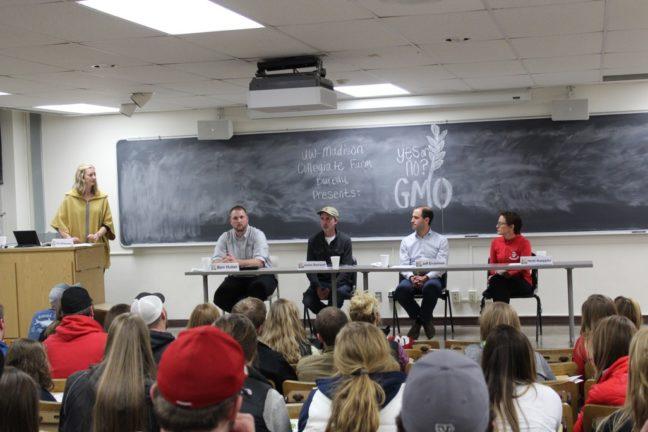University of Wisconsin students, faculty and community members gathered to discuss agriculture’s most controversial topic: genetically modified organisms and crops.
The University of Wisconsin Collegiate Farm Bureau hosted the “Yes or No GMO” panel. Industry professionals looked to educate and answer questions about GMOs at the Thursday event.
Jeff Endelman, an assistant professor in the Horticulture Department and principal investigator for the UW Potato Breeding Program said as GMOs become more popular, people’s perceptions will change and more people will see the health benefits they can have.
The panel discussed how GMO crops are used for insect repellent and drought resistance, which aids in producing better yields for feeding animals and selling for profit.
Heidi Kaeppler, an associate professor in the Department of Agronomy, said non-GMO products are equally as safe to consumers as products containing GMOs.
“Any type of plant breeding that people do could be considered genetically modified, which is why people who come from a scientific background don’t like it because it creates confusion,” Endelman said.
GMOs are actually helping with environmental effects, Kaeppler said. She gave the example of being able to switch to no-till farming systems, which in turn reduces pesticide usage, effectively saving soil and reducing carbon release.
Panelists said becoming more educated and researching the benefits and impacts of GMOs will allow people to better understand and discuss the impact GMOs can have in crop production.
Abigail Martin, a UW junior and member of the CFB, said it is important people come together to discuss and learn from others in the field of GMOs.
Opposition for GMOs started with organizations who disagreed with pesticides in general, Endelman said. It was a way to try to create change in the use of pesticides in agriculture, he added.
Endelman said studies show adverse effects of genetic engineering are not the same crops used for commercial reproduction. those GMO crops are solely used for research purposes, he said.
Moving forward, Emily Matzke, a UW freshman and member of CFB, said it is important for both the consumers and those from the industry to talk and be able to break down some of the misconceptions surrounding GMOs.
“It’s important for agriculture to be transparent with consumers, and for consumers to have the facts on what is in their food and the effects it has to their health and the environment,” Matzke said.


